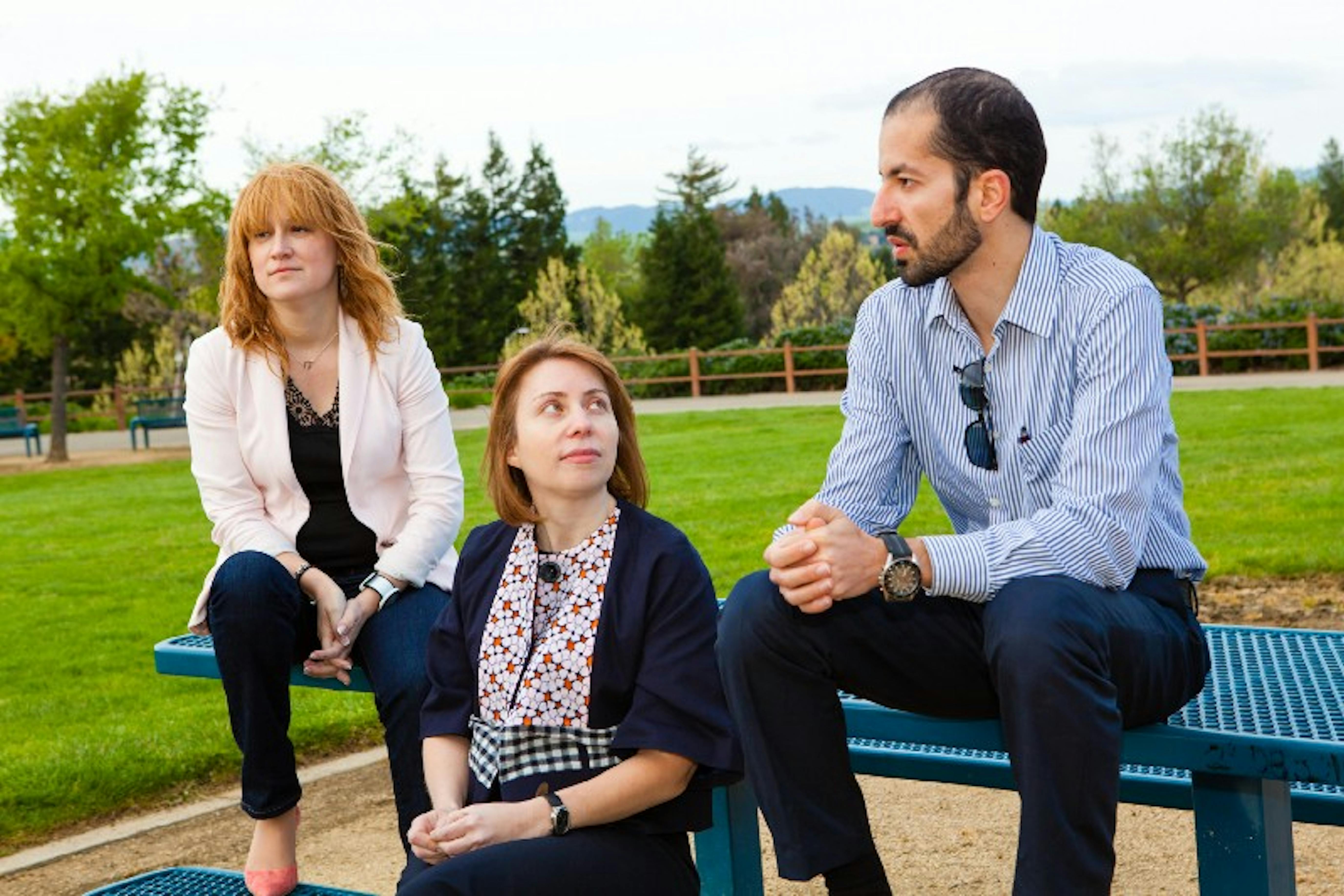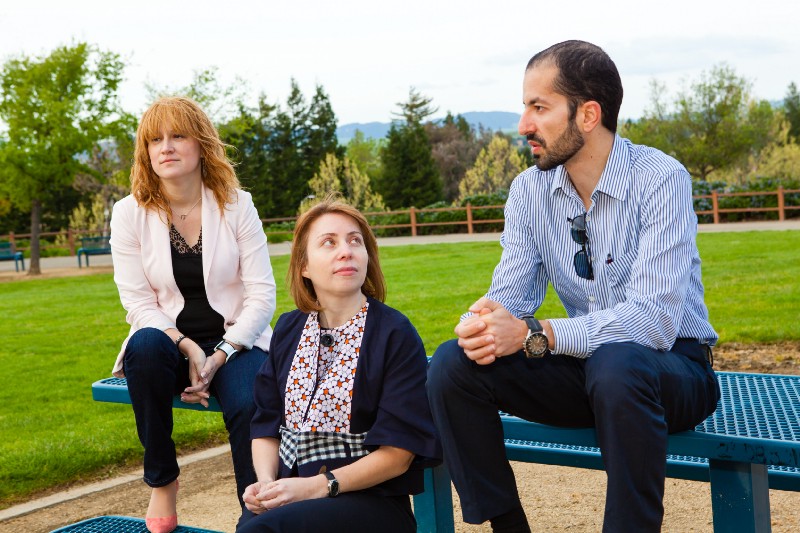A conversation with Nikki Cicerani + Anne Kirwan of Upwardly Global

Right now across the U.S., there are nearly two million college-educated immigrants and refugees who are unemployed or underemployed. Upwardly Global (or “UpGlo”), a Tipping Point grantee since 2011, is working to integrate this population into the American workforce. Last week, we sat down with UpGlo President + CEO Nikki Cicerani and Anne Kirwan, Director of Development and Strategic Partnerships for the Western Region, to discuss UpGlo’s position on the new immigration policy, how to educate employers about hiring immigrants and refugees, and the current status of the American Dream.
Tipping Point: What brought you to this work?
Nikki Cicerani: I’ve always had a social justice bent. It arose from growing up looking ethnic. People assumed I was half black and first called me the N-word when I was really little. Then I had an experience in school of coloring a picture of myself in brown and my teacher had a really unfortunate reaction. So I was very young when I realized that how you look, and how you’re perceived, will influence how you’re treated. It was always intuitive to me that those sentiments get embedded in policy, that they can create structural inequity.
When I came to the end of my senior year at Cornell, I realized that because I came from a largely blue-collar family, my connections were not going to help me get a job. I had missed the window for on-campus recruiting and so there I was, a good degree, a good GPA, but I didn’t know how to target my search or sell myself. When I came to work for UpGlo, I didn’t have much experience with refugee and immigrant populations, but I understood the experience of our jobseekers: it’s aptitude, motivation, and eagerness, without opportunity or preparedness.
Anne Kirwan: When I graduated from college in Ireland, unemployment was about 15%. If you wanted a job, you went elsewhere. So I left for Holland, where an agency arranged housing and a job for foreign-born professionals like me. I was assigned to work the conveyor belt of a chicken factory. As a college graduate, it felt awful to be doing that work. I made barely enough to pay rent. But I was young, and trusted that I would find a way out. It was very different for some of the older women from Yugoslavia, Turkey and Greece — they had families to provide for, no local network, and no support. They were trapped. When I got to the U.S., I knew I was passionate about serving this same population.
TP: UpGlo serves two distinct populations, skilled immigrants and skilled refugees. What are the differences between the two and what can you tell us about the refugee experience specifically?
NC: Immigrants usually come to the U.S. by choice. Refugees do not. When refugees are fleeing their home country, they typically end up in an interim place like a refugee camp or a third party country like Jordan. Then the United Nations High Commissioner for Refugees determines where they are settled, and it’s only after a very long government vetting period that they gain admittance into the U.S. The trauma of this experience is real. Refugees typically have minimal resources, no documentation, and must learn to navigate a completely new culture.
Once here, this population goes through a kind of formal integration process as they resettle, which usually includes housing, help for children enrolling in school, English language classes and some support to secure a job. The resettlement system’s predominant goal is rapid attachment — to get you a job as quickly as possible using a cash assistance incentive — so the bulk of refugees end up with what we at UpGlo call “survival jobs”- low-skilled, minimum wage positions. Approximately a third of refugees hold a bachelor’s degree or better and the system doesn’t often differentiate outcomes for those who could be contributing at a greater level. It’s a loss to those individuals, as well as to our economy overall.
AK: The current climate is hostile towards refugees — many come from the places in the world where we now have a proposed stay of immigration. About 1 in 4 of our Bay Area jobseekers is a refugee or asylee, so we went from a reality where 110,000 refugees are admitted to only 50,000 gaining entry this year. There is incredible fear, anxiety and uncertainty amongst our population, who do not feel welcome here, or who can no longer safely travel or send for their families. There has been an increase in hate crimes across the Bay Area. Since January, we have brought together as many informational and legal resources as we can. We have built out a customized refugee portal, developed a specific training called ‘volunteering with refugees,’ and hosted an open house where our alumni could gather to support our refugee jobseekers.
TP: What are the most common myths about the immigrant population?
AK: The average American has no idea how people come into this country. And we tend to see immigrants as one monolithic group. Many immigration events in California focus only on undocumented immigrants. In this state, there’s an association that immigrants are either undocumented or low-skilled. And although this population deserves attention and debate, it’s also important to think about the 452,000 skilled immigrants who are unemployed or underemployed. They are almost twice as likely to be in poverty as their native-born peers. They’re UpGlo’s target population.
NC: There’s also a misunderstanding I think around the ‘immigrants take jobs’ rhetoric. We’ve had 4,500 people obtain their first professional jobs through the support of our program and in zero cases did an employer pre-agree to hire them. In almost every case, they interviewed for a job in which they were the best candidate, and so they were hired.
TP: There are many barriers to employment for those you serve — unfamiliarity with the job search, little knowledge about workplace culture, foreign degrees and so on. How do you shift an employer’s perspective on hiring immigrants and refugees?
NC: Since the beginning, UpGlo has understood that you can give immigrants and refugees all the job search skills and all of the contextualized language skills they need, but unless you have employers at the table, and unless you are shifting their awareness and thinking around the population, then you can only get so far. At the end of the day, it comes down to one person across the table from another in an interview.
We do a lot of employer education. We talk to companies about who immigrants and refugees are, foreign education systems, and what they might be doing to inadvertently screen out those with non-traditional backgrounds. We try to shift their thinking, sometimes on very specific things — gaps on resumes due to time spent in a refugee camp, for example — not as a deficit, but as a hallmark of success, a sign of resilience and grit.
Over the years, we’ve found a couple of things. There are two elements to successful partnerships: executive leadership and the will of the employees. When those two things are in place, magic happens. Nimbleness is also imperative, whether it’s in culture or in size, we do best collaborating with companies who are willing to be adaptable in the near-term to achieve big gains in the long-term.
TP: Let’s talk policy. What does UpGlo have to offer in terms of advocating for inclusion of skilled immigrants in federal, state, and local workforce policy?
NC: Over the past few years, we’ve learned that the vast majority of workforce efforts in the U.S. paint immigrants and refugees with a broad brushstroke, and most focus on helping them get low-skill, low-wage jobs. As we started to grow and look at sources of government funding, we realized that high-skilled or educated immigrants and refugees are written out of a lot of policy. They’re misunderstood. In some cases, government funding is expressly limited to those who don’t already have a bachelor’s degree or post-secondary education, despite the fact that, without support, our population struggles just as much as its less educated counterparts. The way policies are written means we’re leaving out a vulnerable yet very high potential population.
We made a lot of progress with the first Task Force on New Americans that the White House formulated in 2014. But now, we’re in a completely different day. Upwardly Global has 4,500 data points about the contributions of immigrants and refugees in the U.S. This data shows that our jobseekers are eking out middle class lives in America and filling a stratum of middle class jobs that in many ways employers can’t otherwise figure out how to fill. I think of Alpha, one of our first participants. He came here as an asylee with his four sons, the oldest of which just got into a tremendous private college on a full-ride scholarship. Alpha bought a home, he’s practicing in his career field as an accountant, he just got a raise. Our data is so overwhelmingly, eye-poppingly meaningful and it’s about people from all over the world including around a third from Muslim-majority countries. We need to start educating people about that.
TP: Some would argue that the concept of the American Dream has been in jeopardy for a long time. Is this notion of widely available socioeconomic mobility a helpful or hurtful narrative to those you serve?
NC: I think the traditional idea of the American Dream, that everybody can make it big, is not the same idea our jobseekers have. For them, it’s all about self-determination. In some cases, it’s about living free, or about their children doing better, and in some cases, it’s just about having room to stretch and grow.
Are there ways in which economic mobility is unrealistic right now? Absolutely. Global immigration shows that America is still the number one destination for immigrants. What it also shows is that it’s less so than in past years. But I think the idea of coming to the U.S. and being able to carve your piece out, even if it’s not the biggest piece, is still alive and well. I think that concept is one that they gravitate towards, and I think it’s still what pulls people to this part of the world.
To learn more about Upwardly Global’s efforts and how you can get involved, please visit upwardlyglobal.org. To read Tipping Point Founder + CEO Daniel Lurie’s response to the travel ban, see here.


